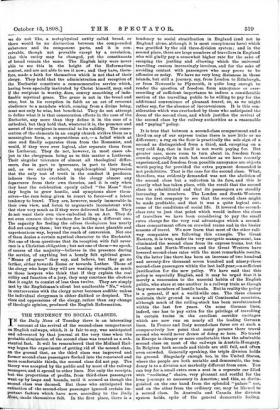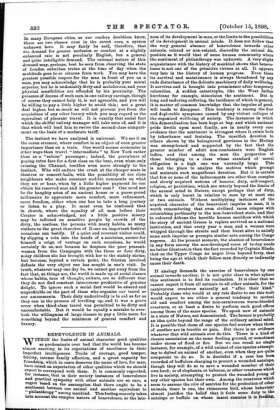THE TENDENCY TO SOCIAL CLASSES.
IN the Daily News of Tuesday there is an interesting account of the revival of the second-class compartment on English railways, which, it is fair to say, was anticipated and advocated by that journal at the very time when the probable elimination of the second class was treated as a sub- stantial fact. It will be remembered that the Midland Rail- way began the experiment of getting rid of the second class, on the ground that, as the third class was improved and former second-class passengers flocked into the renovated and more comfortable thirds, the second class did not pay. The theory was accepted by the public and by most of the railway managers, and it spread to other lines. Not only the receipts, but the proportions of profits, from third-class passengers went up by leaps and bounds, until it seemed as though the second class was doomed. But those who anticipated the extinction of the second-class passenger ignored certain im- portant factors which have now, according to the Daily News, made themselves felt. In the first place, there is a tendency to social stratification in England (and not in England alone, although it is most conspicuous here) which was gratified by the old three-division system ; and in the second place, there are large numbers of travellers in England who will gladly pay a somewhat higher rate for the sake of escaping the jostling and elbowing which the universal travelling custom increasingly involves, and for the sake of avoiding contact with passengers who may prove to be offensive or noisy. We have no very long distances in these islands, but still a journey, say, from London to Edinburgh, or from Newcastle to Plymouth, is quite long enough to render the question of freedom from annoyance or over- crowding of sufficient importance to induce a considerable section of the travelling public to be willing to pay for the additional convenience of pleasant travel, or, as we might rather say, for the absence of inconvenience. It is this con- sideration which was overlooked by those who anticipated the doom of the second class, and which justifies the revival of the second class by the railway authorities as a reasonable and "paying" policy.
It is true that between a second-class compartment and a third on any of our express trains there is now little or no difference ; a rug on the floor is practically the sole sign of a second as distinguished from a third, and, excepting on a. very cold day, that in itself is not worth paying for. But greater ease, more room to turn about in, freedom from crowds especially in such hot weather as we have recently experienced, and freedom from possible annoyance are objects worth paying for provided the extra payment demanded is not prohibitive. That is the case for the second class. What, therefore, was evidently demanded was not the abolition of the second class but a reduction in its fare, and this is exactly what has taken place, with the result that the second class is rehabilitated and that its passengers are steadily increasing in numbers. The London and South-Western was the first company to see that the second class might be made profitable, and that it was a quite logical out- come of the conditions of social life. It lowered the second- class rate to just that point which would induce the class of travellers we have been considering to pay the small extra charge for the very real advantages which a second- class compartment offers on crowded trains and in the busier seasons of travel. We now learn that most of the other rail- way companies are following this example. The Great Eastern, it is true, under its very energetic management, has eliminated the second class from its express trains, but the London and North-Western and the Great Western have lowered second-class rates with the most remarkable results. On the latter line there has been an increase of two hundred and seventy-five thousand seven hundred and ninety-three second-class passengers within the last half-year,—a sufficient justification for the new policy. We have said that this policy is especially English, and it may be urged that it is merely a concession to the unsocial habits of the English public, who stare at one another in a railway train as though they were members of hostile bands. But in reality the policy is a general, if not a world-wide one. The three classes maintain their ground in nearly all Continental countries, although much of the rolling-stock has been revolutionised within the last few years. On some German lines, indeed, one has to pay extra for the privilege of travelling in certain trains in the excellent corridor carriages which are now run on nearly all the leading German lines. In Prance and Italy second-class fares are at such a comparatively low point that many persons there travel second who would never dream of doing so here. No travel in Europe is cheaper or more comfortable than the admirable second class on most of the railways in Austria-Hungary. In Belgium both seconds and thirds are still full, and often even crowded. Generally speaking, the triple division holds its ground. Singularly enough too, in the United States, where the people are both sociable and democratic, the ten- dency is to a division not markedly different from ours. You can buy for a small extra sum a seat in a separate car filled with " reclining " chairs, very pleasant and restful for the long journeys so necessary in America; and this, as distin- guished on the one hand from the splendid " palace " car, and on the other from the ordinary car, may be likened to a second class. In Australia and Canada the division system holds, spite of the general democratic feeling. In many European cities, as our readers doubtless know, there are two classes even in the street cars, a system unknown here. It may fairly be said, therefore, that the demand for greater seclusion or comfort at a slightly enhanced rate is not peculiarly English, but a general and quite intelligible demand. The rational nature of this demand may, perhaps, beat be seen from observing the state of London suburban trains at the time of day when the =altitude goes to or returns from work. You may have the greatest possible respect for the man in front of you as a man, you may acknowledge that he is probably your moral superior, but he is undeniably dirty and malodorous, and your physical sensibilities are offended by his proximity. The presence of dozens of such men in one railway carriage, though of course they cannot help it, is not agreeable, and you will be willing to pay a little higher to avoid this ; not a great deal higher, but so much as will not prevent you from the acquisition of any other luxury which you may regard as the equivalent of pleasant traveL It is exactly that social fact which the skilful railway manager will take note of, and it is that which will lead him to revive the second-class compart-
ment on the basis of a moderate tariff.
The instinct we have analysed is universal. We see it on the ocean steamer, where comfort is an object of even greater importance than on a train. One would sooner economise in other ways than travel " intermediate " to New York rather than as a "saloon" passenger ; indeed, the prevalence of paying extra fare for a first class on the boat, even when only crossing the Channel, testifies even more strongly to the instinct. Who will endure the crush at the cheaper seats in theatres or concert-halls, with the possibility of too close neighbours who make constant audible comments on what they see or hear, when by a little higher payment he can obtain his reserved seat and his greater ease ? One need not be the haughty scion of an ancient house or a purse-proud millionaire to appreciate more comfort, more refinement, more freedom, either when one has to take a long journey or listen to a play. It mast even be confessed that in church, where the equality of all men before their Creator is acknowledged, not a little positive misery may be inflicted on sensitive people by crowds of the dirty, the restless, the persons with nasty habits, as many visitors to the great churches of Rome on important festival occasions can testify. If a quiet and reverent visitor could, by slipping a coin into the hands of a sacristan, secure for himself a coign of vantage on such occasions, he would certainly do so, not because he despises the poor peasant. woman from the Campagna with the three or four dirty, noisy children she has brought with her to the stately shrine, but because, beyond a certain point, the friction involved defeats the very object one has sought in one's visit. In truth, whatever may one day be, we cannot get away from the fact that, as things are, the world is made up of social classes whose habits, tone of thought, culture, are Bo different that they do not find constant intercourse productive of genuine delight. To ignore such a social fact would be absurd and unprofitable on the part of those who organise our travel or our amusements. Their duty undoubtedly is to aid as far as they can in the process of levelling up, and it was a grave error when third-class travel was permitted to be dirty and uncomfortable. But it would be equally a mistake to over- look the willingness of large classes to pay a little more for something beyond the minimum of general comfort and luxury.







































 Previous page
Previous page